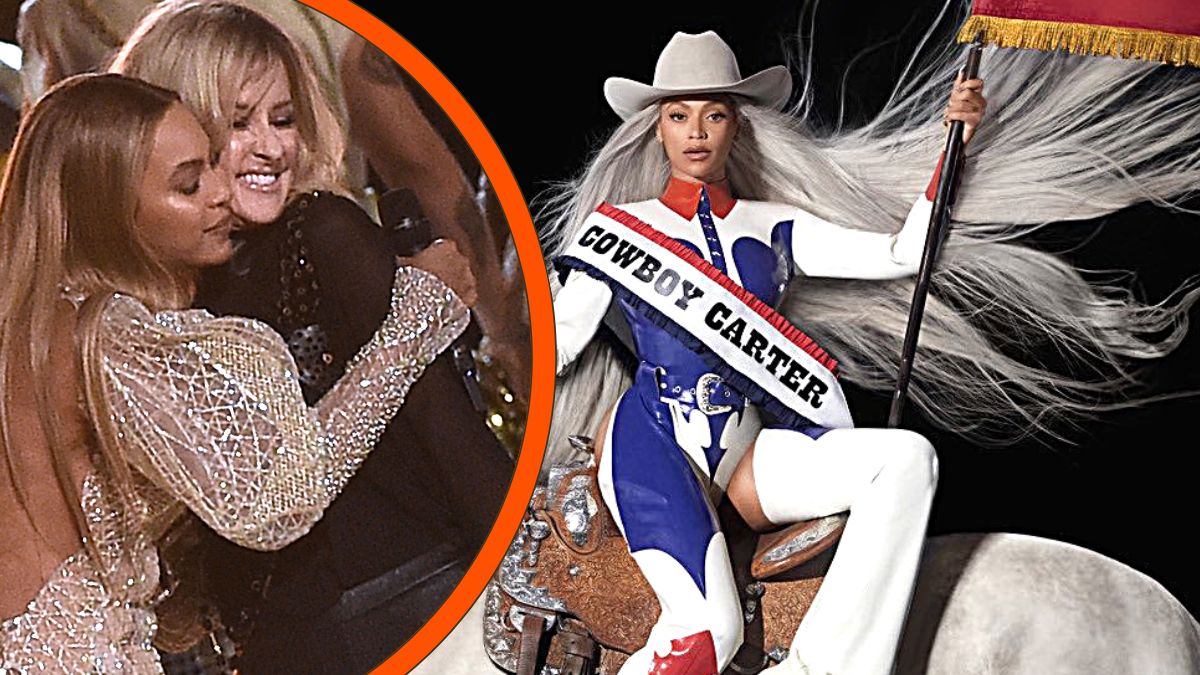Beyoncé is reclaiming space for Black artists in popular music genres one by one. After Renaissance and dance/house, her upcoming eighth studio album Cowboy Carter is highlighting African American influences in the predominantly white country music scene.
The Texas-born musician revealed the cover of the upcoming body of work on her social media on Tuesday, March 19. The artwork, wherein Beyoncé can be seen riding a horse sideways while waving the American flag, was accompanied by some context on why she decided to make Cowboy Carter. “This ain’t a Country album,” she says, “This is a ‘Beyoncé’ album.”
The meaning behind Beyoncé’s new album
On Feb. 20, Beyoncé became the first Black woman in history to top the Billboard Hot Country Songs chart with her viral hit “Texas Hold ‘Em,” but the feat didn’t come without its fair share of backlash. Before Beyoncé, only seven Black female country acts had been featured on the chart in its over 60-year-old history.
Radio plays a big part in getting songs to chart. According to The Washington Post, “From 2002 through 2023, songs by White artists averaged 96.5 percent of country radio airplay,” and only an average of .06 percent of the remaining spins were given to songs by women of color. Beyoncé, being Beyoncé, was propelled by her passionate Bey-Hive and broke through these barriers with a lot more ease than the women who came before her, but still made sure to platform other Black country artists without her kind of brand power.
As Taylor Crumpton points out in a piece on the African American origins of Country music for Time Magazine, long-time advocate for the banjo’s African roots Rhiannon Giddens plays both that instrument and viola in “Texas Hold ‘Em” and Black trailblazer steel guitarist Robert Randolph lends his talents to “16 Carriages.” Cowboy Carter is a statement on Beyoncé’s part, and she’s using her influence to raise the profile of a discussion that many smaller artists have been trying to have for ages.
If those choices hadn’t made this clear enough, the singer put those doubts to rest. According to her Instagram post, Cowboy Carter was born when she performed her one other country song, Lemonade‘s reverberating “Daddy Lessons,” at the Country Music Awards in 2016. The Grammy record-holder was joined on stage by the similarly boundary-pushing Dixie Chicks for an epic performance that, according to Natalie Maines, was met with a bombardment of racist “comments and emails” on the CMA website, forcing the awards to take the performance down.
“This album has been over five years in the making. It was born out of an experience that I had years ago where I did not feel welcomed…and it was very clear that I wasn’t.”
Beyoncé, who was famously born and raised in Houston, Texas, and according to her mother Tina dressed in Western fashion and went to rodeos every year since she was a kid, took the experience as motivation to dig deeper into that side of her roots.
Black cowboy culture has been seeping more and more into pop culture. From Lil Nas X’s smash hit “Old Town Road” and Jordan Peele’s gender-bending sci-fi masterpiece “Nope” to Solange Knowles’ own love letter to Texas’ Black cowboys in her album When I Get Home, the needle has been slowly moving. Beyoncé, as the biggest entertainer on the planet, has just come and knocked the whole door down.
What about the title Cowboy Carter?
Fans were quick to point out the apparent reference to “The First Family of Country Music,” which they theorized went much deeper than just their common last name. By being a counterpoint to the all-white Carter family, Beyoncé not only subverted their name within the Country genre, but also shined a light on a man whose influence has been widely undervalued in comparison.
Lesley Riddle was an African-American musician who worked closely with the Carter Family, co-composing some of their music and even teaching Maybelle Carter his unique guitar technique, which she would later adapt and popularize as the famous Carter scratch. This, in turn, made the guitar a nuclear instrument in country music.
Again, Beyoncé has not made any official statements about the connotations of her upcoming album’s title, but considering her recent statement on how racism within country music and the unsung African-American history in the genre, this theory doesn’t seem wildly far-fetched.
Cowboy Carter arrives on March 29.











Published: Mar 19, 2024 04:04 pm